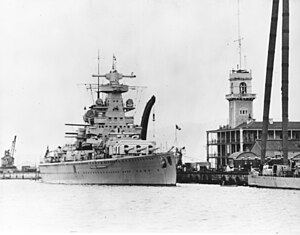Panzerschiff

Admiral Scheer at Gibraltar in 1936
|
|
| Class overview | |
|---|---|
| Name: | Deutschland |
| Operators: | |
| Succeeded by: | Admiral Hipper class |
| Built: | 1929–1936 |
| In service: | 1933–1945 |
| Completed: | 3 |
| Lost: | 2 scuttled, 1 sunk |
| General characteristics | |
| Displacement: |
|
| Length: | 186 m (610 ft 3 in) |
| Beam: | 21.69 m (71 ft 2 in) |
| Draft: | 7.25 m (23 ft 9 in) |
| Propulsion: |
|
| Speed: | 26 knots (48 km/h; 30 mph) |
| Range: | 10,000 nmi (19,000 km; 12,000 mi) at 20 knots (37 km/h; 23 mph) |
| Complement: |
|
| Armament: |
|
| Armor: | |
| Aircraft carried: | Two Arado Ar 196 seaplanes |
| Aviation facilities: | One catapult |
| Notes: | |
The Deutschland class was a series of three Panzerschiffe ("armored ships"), a form of heavily armed cruiser, built by the Reichsmarine officially in accordance with restrictions imposed by the Treaty of Versailles. The ships of the class, Deutschland, Admiral Scheer and Admiral Graf Spee, were all stated to displace 10,000 long tons (10,000 t) in accordance with the Treaty, though they actually displaced 10,600 to 12,340 long tons (10,770 to 12,540 t) at standard displacement. Despite violating the weight limitation, the design for the ships incorporated several radical innovations to save weight. They were the first major warships to use welding and all-diesel propulsion. Due to their heavy armament of six 28 cm (11 in) guns, the British began referring to the vessels as "pocket battleships". The Deutschland-class ships were initially classified as Panzerschiffe or "armored ships", but the Kriegsmarine reclassified them as heavy cruisers in February 1940.
The three ships were built between 1929 and 1936 by the Deutsche Werke and Reichsmarinewerft in Kiel and Wilhelmshaven, respectively. They saw heavy service with the German Navy. All three vessels served on non-intervention patrols during the Spanish Civil War. While on patrol, Deutschland was attacked by Republican bombers, and in response, Admiral Scheer bombarded the port of Almería. In 1937, Admiral Graf Spee represented Germany at the Coronation Review for Britain's King George VI. For the rest of their peacetime careers, the ships conducted a series of fleet maneuvers in the Atlantic and visited numerous foreign ports in goodwill tours.
...
Wikipedia
